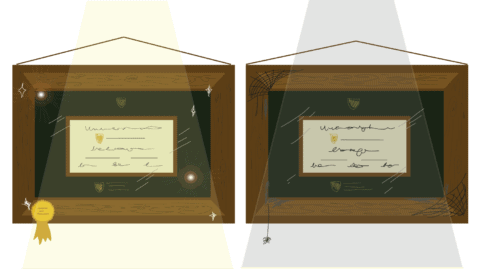While we are often fed the idea that a post-secondary education is valuable, it’s time we put away the antiquated belief that one size fits all and that a degree in any field is comparable to another. Just because you get a degree, you’re not guaranteed to get good use out of it.
The truth of the matter is that within any one university, the quality, value and difficulty of each degree is going to vary. Students of today grew up in a post-Mr. Rogers, “follow your dreams” world. Likewise, all you ever hear about university in the 21st century is that a bachelor’s degree is the new high school diploma when it comes to landing a job.
However, that analogy is inherently misleading — my grade 12 education is worth just as much as yours. This is not the case in university where, unfortunately, not all degrees are created equal.
For starters, there’s the issue of comparison. Speaking as someone who has dipped his toes into classes in a few different departments: I refuse to believ e that bachelor’s degrees in computer science, English and marketing are all equally as difficult to get. If you can’t even compare what’s being taught, how can you compare if it’s being taught at the same difficulty level?
e that bachelor’s degrees in computer science, English and marketing are all equally as difficult to get. If you can’t even compare what’s being taught, how can you compare if it’s being taught at the same difficulty level?
True, every individual person has areas of strength and weakness and what one person finds challenging may be easy to another, but that only further underlines the fact that university programs can’t all be as objectively difficult as each other.
More tragically, there’s also an issue of the value of a degree, because let’s not kid ourselves — you get a degree to get a job. If you get a degree in something like computer science, biology or urban planning, you’ll come out of university with some highly specialized knowledge and — most likely — enter into a job field that needs you.
Compare that to something like a degree in the fine arts, which is stimulating, challenging and practically impractical for anyone looking for gainful employment. Someone who pursues a degree in a field like that is by no means unintelligent, but let’s be real, the decision to study art history may not reflect on you so flatteringly.
I agree with Mr. Rogers in that I believe people should chase their dreams, but you need to chase them with 20/20 vision. You can’t have your cake and eat it too. If you study the history of feudal Finland with a passion, good for you and I’m happy for you, but don’t expect that people will be busting down doors to hire you.
The plain truth is that degrees aren’t very useful — only the right ones are. There’s nothing wrong with admitting that a university education isn’t an instant doorway to success — and truth be told, it’s a bit exhilarating to admit it.
So then this raises a question: if degrees in various fields are all so different, is it fair to compare their worth? The answer has to be a begrudging “yes.” Just because we’re in university doesn’t mean we’re all setting ourselves up for gleaming futures. It’s an inconvenient truth that we treat like an undesirable flu.
University has value, but fooling ourselves into thinking each degree is as valuable as the next is just plain naive. You can study whatever you want, but don’t let yourself be fooled about the job prospects at the end of the line. No matter what other people say, just because you’re going to university, you’re not guaranteed to leap into the job market when you’re finished.
—
Zach Tennent / Opinions Editor
Graphic: Lesia Karalash / Graphics Editor
Leave a Reply